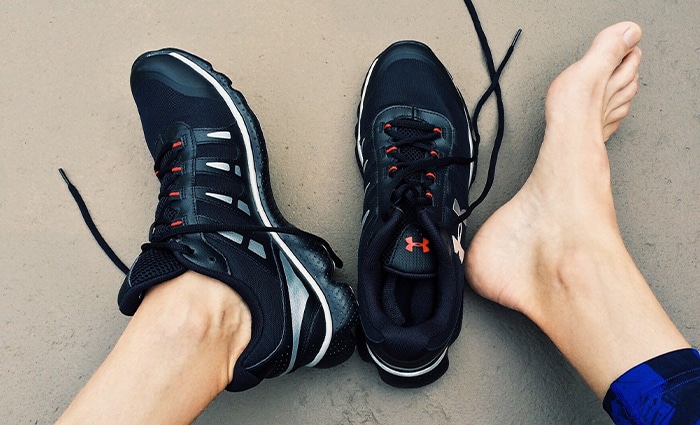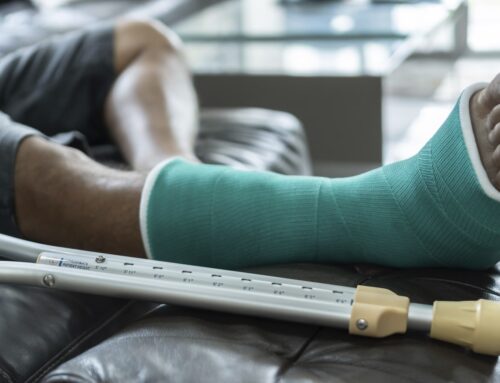Achilles tendinitis is a condition that affects the Achilles tendon that connects the muscles in the back of your calf to your heel bone. Those who are physically active and between the ages of 30-50 are the most likely to develop this issue. While complications can arise if not treated quickly, it is very treatable, and most individuals recover completely. The foot and ankle specialists at Cary Orthopaedics treat Achilles tendinitis and many other conditions. Our doctors focus not only on treating the symptoms of foot & ankle injuries, but in understanding the underlying cause of the pain. Here, our experts share everything you need to know about Achilles tendonitis.
What is Achilles tendinitis?
The Achilles tendon is a strong fibrous cord that attaches the calf muscle to the heel bone. This tendon is used when you walk, run, jump or stand on the balls of your feet. When you continually use this tendon during physical activity, such as running and jumping, inflammation can occur. This painful swelling is known as Achilles tendinitis.
There are two different types of Achilles tendinitis, insertional Achilles tendinitis and non insertional Achilles tendinitis. Insertional Achilles tendinitis affects the area where the heel bone and the tendon are attached, while Noninsertional Achilles tendinitis includes the fibers that are in the center of the tendon. The latter usually affects active young people more often than those who are older. If left untreated, the tendon can tear, which may require surgery to repair the damage.
What are the symptoms of Achilles tendinitis?
If you have Achilles tendinitis, then you will likely experience symptoms such as pain or inflammation of the back of the heel, inability to flex your heel easily, feeling excessive warmth of the skin on your heel or experiencing tightness of your calf muscles. The most common symptom of tendinitis is pain and swelling in the back of your heel, especially when you walk or run. If you are having any of these symptoms, talk to your orthopaedic doctor as soon as possible.
What are the causes of Achilles tendinitis?
Repeated physical activity is the main cause of Achilles tendinitis. If you are an athlete, you may be more prone to develop Achilles tendinitis. However, other factors can contribute to causing tendinitis. For example, if you have rheumatoid arthritis, you are more likely to be at risk. You can also develop tendinitis from any activity that puts a strain on your Achilles tendon. Some factors that contribute to causing tendinitis are taking part in sports that require swift movement and quick stops, a sudden increase of physical activity without proper training, wearing high-heeled shoes for long periods or exercising without a proper warm-up. Another cause of tendinitis is age, as the Achilles tendon weakens as you get older.
What is the treatment for Achilles tendinitis?
There are many treatments available for Achilles tendinitis ranging from home remedies to surgery. You may prefer a less invasive treatment and take herbal supplements or anti-inflammatory medications. You may also decide to take steroid injections. Either way, discuss your options with your orthopaedic specialist.
Non-surgical treatments for Achilles tendinitis
If you do not want to undergo surgery to correct your tendinitis, you have several other options. Your doctor may tell you to limit your physical activity or switch to less strenuous activity. You may need to wear a brace or walking boot to prevent your heel from moving. Wearing a special shoe with a built-in heel can also help reduce tension on your heel. Physical therapy is another non-invasive option.
Before and after you exercise, stretch your calf muscles, elevate your foot and ice it if you are experiencing pain. Another way to treat tendinitis pain is by using the RICE method. RICE stands for rest, ice, compression and elevation. Resting means that you do not put any strain until you can walk on it without pain. You may even need to use crutches for a while. Icing the area for 15 to 20 minutes will help to decrease the swelling and inflammation. Do not ice for extended periods of time to avoid the possibility of frostbite to the area. Compression consists of securely wrapping a bandage or athletic tape around your heel. Do not wrap it too tightly, as it can cut off blood flow to the area. Then, elevate your foot above your chest by laying down with your leg resting on a pillow. The elevation will help to keep the swelling down by returning blood to your heart and not your foot.
Surgical treatments for Achilles tendinitis
If non-invasive treatment is not effective in treating your injury, then surgery may be needed. When conditions worsen and are not treated, it can lead to a rupture of the Achilles tendon, which requires surgery. A few options can be suggested by your doctor, and you may be referred to an orthopedic surgeon. One method is called open repair. This procedure requires a doctor to open up your leg above the heel bone and sew the two sides of the ruptured tendon together. Another procedure involves opening up the area where the rupture has occurred, suturing through the tendon and the skin, and out through the incision area. Then, all sutures will be tied together.
Living with Achilles tendinitis
Living with Achilles tendinitis can be challenging as it makes it difficult to walk without experiencing pain. You may need to take over-the-counter pain medications, such as ibuprofen or naproxen. If these medications are not strong enough, you may need to take prescribed anti-inflammatory medications. Follow your doctor’s instructions so you do not overexert your tendon or calf muscles. Physical therapy may be another option to help you deal with constant pain. It should also help to strengthen the tendon as well as promote healing. Monitor your pain from day to day, and if the pain becomes unbearable, tell your doctor.
Achilles tendinitis treatment in Raleigh
Achilles tendinitis can cause complications if not dealt with properly. Speak with your doctor if you are experiencing any symptoms of Achilles tendinitis before it becomes worse. Unfortunately, tendinitis is not a problem that will disappear. It may be years before you no longer have pain. Yet, if you follow your doctor’s instructions, you can completely recover.
The foot and ankle specialists at Cary Orthopaedics can help if you are experiencing pain from Achilles tendonitis. We diagnose and treat a wide array of conditions, and we strive to educate our patients on the benefits of strengthening and stretching the feet and making proper shoe and insole selections. To make an appointment, contact us today.






